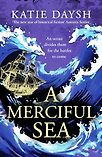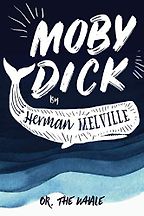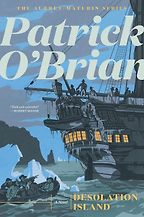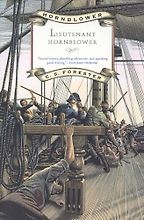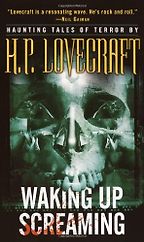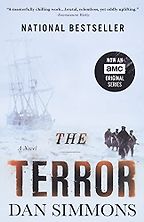Before we get to the books you’ve chosen, can you give us a quick introduction to why you’re attracted to books about ships and the sea?
It’s probably to do with the fact that I’ve always lived by the sea. If I go upstairs, I can see the sea from my window. The Isle of Wight has so many sea stories—there’s so much smuggling history here. And naval history as well. One of my favorite places to visit is the Portsmouth historic dockyards just across the water. I love visiting the ships that I write about now, seeing what it would have been like on deck and imagining how it would have felt to sail them. So it’s always been around me and I’ve always had a background interest.
I did do a history degree with the Open University, but I found I didn’t really like writing historical nonfiction. I wanted to explore historical themes, but from a more fictional perspective, to try and bring it to life. The sea is a really good setting to put characters in, because they’re so isolated. They’re in very small, almost claustrophobic groups on these ships. It’s such a good way to really put characters to the extreme and see how they behave: all these different personalities that the crew and the officers might have and how they clash or how they work together.
The books you’ve chosen are mainly classic naval historical novels. Were you reading those before you studied the history and started writing in the genre?
I read Moby-Dick about 13 years ago, way before I started to write naval fiction. I read it because I really like the film Jaws, and the main character in that was based on Ahab in Moby-Dick. I read it and I just really, really liked it. The Patrick O’Brian one, I read around the same time, because Moby-Dick got me really into those seafaring stories and the Patrick O’Brian series is the big one. The other ones I read more recently. The Terror was the one that got me thinking I could write my own naval fiction. The Hornblower one I read after I got into writing naval fiction because I loved the TV series. So it’s a bit of a mix.
Let’s go through the books you’re recommending. You’ve already said a bit about Moby-Dick, which is quite a long novel. Tell me what you loved about it and why you think other people should read it.
Moby-Dick was the book that really started my love of sea stories. It’s about crews at the extreme facing quite formidable forces and seeing how they behave in those situations. I like the way the sea is treated as a character all the way through the book, even before they get on board the ship. The sea is prevalent in everything, this ominous force in the background.
I like the characters and the different dynamics between them. Starbuck, the first mate, is maybe my favorite fictional character of all time. I just really engaged with the journey he goes on. He’s a good man and he’s always trying to do what’s right. But what is right in the circumstances is not the thing he is supposed to do. As a first mate, he’s meant to obey the captain. But to obey the captain in this situation is to put the crew in danger and to go against his own sense of honor and his own ethics. That sort of conflict is really interesting to me, and one I like to explore in my own stories. The conflict doesn’t have to be between two people, it can be inside a person as well.
I like characters who are really determined or obsessed with one main goal. For Ahab, it’s hunting down the whale. But it’s not just about him and the whale. It’s about him putting all of the things he thinks have gone wrong in the world onto the whale. He thinks that if he can defeat the whale, he can defeat everything that’s gone wrong in his life. I found that character development through the story fascinating.
There is a scene I remember at the end of the book. It’s a small chapter called “The Symphony,” when Ahab is talking to Starbuck. It shows that there’s a bit more to Ahab than just being absolutely obsessed with this one goal. He’s got a wife and a child at home. There’s a glimpse that behind his obsession, there’s an actual man. It’s as if he’s been captured by his own obsession. It’s like an illness he’s got.
I also like Moby-Dick because I think of it as the first queer naval fiction. I know you’re always going to bring yourself to a book as a reader, but I think Moby-Dick is as queer as it could be for the time it was written in. At the start, Ishmael meets Queequeg in the inn where he’s staying and they share a bed. Then, the next morning, they divide their possessions up between them, Queequeg proclaims that they’re married now, and Ishmael is perfectly happy to go along with it. For the rest of the book, they’re treated like a partnership—as if they’re married, really. For a book that was written in the middle of the 19th century, it’s surprising it’s that obvious.
It’s why queer stories and sea stories interlink. The sea is almost treated as apart from the land. It has its own society, with its own rules and regulations. With queer stories a lot of the time the characters don’t feel like they fit in on land. They go to sea to try and find themselves and maybe find another community out there that they do fit in.
Let’s move on to Patrick O’Brian and his books. You’ve chosen Desolation Island (1978), which is the fifth book in his series of 20 or so books featuring Jack Aubrey, a captain in the Royal Navy, and Stephen Maturin, a physician and naturalist. Why did you pick out this particular one? Also, is it OK to start with Desolation Island, or is it better to go back to the beginning?
I think it’s one of those series where you can probably pick up whenever and it would make sense, but it works best if you do start at the beginning and see how the characters develop. I had a bit of trouble with the series as it went on. It becomes more about Stephen and loses a bit of the naval side, I felt. But at the start, it’s this really good story and with a good balance between the two main characters.
Desolation Island has everything that I love about naval fiction. There’s a near-mutiny, there are storms and all this seafaring stuff. They go down near Antarctica. Polar exploration is one of my niche obsessions in history, so I really like the setting. Patrick O’Brian is good at bringing to life what it would have been like on those ships: the big details and little details, the lower decks of the normal crew, and the officers. It’s like a slice of life narrative he has in his books, where it’s very, very intimate and very focused on the characters and their behaviors and their world.
He’s good with the seafaring jargon as well, and the technical details—I think almost too much, at times. He shows that he knows what he’s talking about, and it’s very authentic.
I like Jack and Stephen as characters because they’re so different to start with, and they don’t get on that well. Then, as the stories go on, they find they’re becoming more and more similar to each other. They’ve got these unifying points that they bond over. And they’ve got a shared experience on the sea as well, which is a theme that I really enjoy in naval fiction—the shared bonds and the shared almost traumas they have on the sea.
Maybe not traditional readers of the series, but I know a lot of people who see a queer element in their friendship. I don’t, particularly. Especially with Jack, I don’t really get queer vibes from him. But what I like is that it’s almost like a platonic marriage between them, and everything they go through together.
Now we’re going to a book first published in 1952. This is Lieutenant Hornblower by C.S. Forester, part of his Horatio Hornblower series. Again, does the order matter?
I think he wrote the series out of order. He wrote some and then went back to fill in the details of the ones before. I read them in their chronological order because I felt like that was the best way to get a sense of the characters. I’ve chosen the second one in the series.
I like Lieutenant Hornblower because it’s the only book in the series that tells the story not from Hornblower’s perspective, but from Bush’s. You see the main character through someone else’s eyes. That’s nice to see, because, again, like Jack and Stephen, they don’t get on that well, to start with. Hornblower is quite unconventional in how he goes about his career, whereas Bush is more by the book. They clash, to begin with, and have different styles of leadership. But then they come to be really loyal to each other and have a firm friendship.
As I said, that’s what I like about the genre, those shared experiences and the loyalties: between the officers, between the crew and between the officers and the crew. I know that some people don’t get on so much with Hornblower’s perspective. He can be quite downbeat at times. He’s very self-deprecating and quite self-pitying. But I like it because with the naval genre, the settings can overwhelm the characters. It can be a bit dry: it’s easy to get lost in the ships and the seafaring and the naval history. So I like that he has a strong narrative voice in it. It’s a bit more emotional than some more traditional Age-of-Sail books.
I actually read the books because I watched the TV series, which I really liked. I think it’s stronger than the books. It’s such a good example of Age-of-Sail stories. It’s really fun, really adventurous, but with those nice character friendships throughout it as well.
A lot of these books seem to be set in the Napoleonic Wars. Why is that era so popular?
There are a lot. There’s also the Sharpe series by Bernard Cornwell, which is not naval fiction, but it’s set at the same time on land. I think people just went through a phase in the 20th century, into the start of the 21st, where there was lots of Napoleonic stuff. I like it because it has a big reputation around it, and it has all these different tropes and stereotypes. I like exploring that and looking beyond the tropes and seeing what it might actually have been like—how people felt the weight of those expectations on them. But I don’t really know why it’s got such a broad appeal.
You obviously really like naval historical fiction, but part of the reason you decided to write your own books is that you couldn’t find what you were looking for, is that right?
It’s a really fun genre, and there’s lots I like about it—all the adventure and the history. But even the naval fiction series that are coming out now feel quite traditional. They were predominantly male crews and male officers, but there are basically no queer characters at all.
I wanted to write the things that I loved about the genre, just from a different perspective and a different voice. Because the officers wouldn’t just be experiencing the big expectations upon them of their career and of the ships and of leadership, they’d also be experiencing not really fitting in with the world and with society because of their sexual orientation. I thought that would be interesting to explore, especially on ships where there’s nowhere to hide.
People have an idea that because they’re not reading about these voices in history, that they didn’t exist. But given the number of ships that there were and the number of officers and crew, it’s statistically impossible for them all to be straight.
You’ve written three books: Leeward, The Devil to Pay and then A Merciful Sea, which is out now. Should I be starting at the beginning of the series?
Again, it’s one that you can pick up no matter where you are in the series, but it works better if you start from the beginning, so you get a sense of the characters and their relationships.
Leeward is about Captain Nightingale, who is an officer in the Royal Navy at the turn of the 19th century, and experiences quite a traumatic event at the Battle of the Nile. He nearly loses his ship, and his lieutenant, who he secretly had feelings for, is killed. He takes a period of leave from the Navy, but feels it’s his duty to come back and try and get back on his feet. So he accepts a commission on a ship out in the Caribbean, which has to hunt down another ship that has mutinied and bring the mutineers to justice.
Lieutenant Courtney is also on board the ship. He’s the opposite of Nightingale to start with. He’s really popular with the men and really confident in himself and about his decisions. He’s quite hot-headed as well. But they come together in the end, because they have that uniting goal of finding the ship and also of serving in the Navy.
The next book, The Devil to Pay, takes Courtney’s perspective. It takes place in the brief peace between the French Revolutionary Wars and the Napoleonic Wars. He’s living on the Isle of Wight, and is called back to find another ship which has gone missing on the way to Malta to negotiate some of the terms of the peace.
Then A Merciful Sea is from both of their perspectives. Nightingale’s story is set on the Isle of Wight, where he’s caught in the middle of a clash between a horrible lieutenant and the people who live there. Courtney is with Nelson’s fleet and the story follows the build-up to the Battle of Trafalgar.
That’s the basic plots of all three of them. Through the books, Nightingale and Courtney have this romantic partnership, so it’s half naval fiction and half about their relationship and how they negotiate it on the ships, and in society as well.
Let’s get to your fourth choice, which is a short story: “The Temple” by H.P. Lovecraft.
This one is a bit out there. It’s set on a submarine in the First World War. It represents what I like about the sea as a setting, but does so in a scary horror way. The sea is perfect for that—all the things you don’t know about. It links to sci fi in a way, because it is a bit like spaceships on the edge of what we know.
What I love about Lovecraft’s stories is the atmosphere of them, the building of that weird, unsettling aura. There’s a double dose of that in “The Temple.” You’ve got the sea as a setting, and then you’ve got a submarine as well. They’re completely trapped in it and it’s very claustrophobic.
What I also like is that he’s not afraid to be weird. With some stories, people build up to a point, and then, at the end, they back away from what could be an interesting conclusion to the story or an interesting character moment, and they go a bit safer. Lovecraft sets it up and then he goes for it.
This is not traditional naval fiction. It’s only a dozen or so pages. But it’s got a lot of the same themes as the sea stories and the naval fiction that I like.
So lastly on your list you’ve got a more recent book, The Terror (2007) by Dan Simmons, which takes us to Arctic exploration, in particular the doomed 1845 Franklin Expedition. Tell me about this one.
I loved this book when I read it. I’m now more drawn to the TV series that was made of it, but the book still has elements that are really good. It’s what pushed me back into writing historical fiction and naval fiction.
I like how it uses the setting. Again, the ship is very claustrophobic and then you’ve got them trapped in the Arctic, in the ice—so it’s double claustrophobic. You’ve got all the different crews and the personalities of the crews and the officers and how they clash and how they try to get through it (or don’t get through it, in the end).
The Terror uses a real historical event as a springboard to explore quite interesting themes in historical fiction. It’s using the historical figures as characters, rather than a nonfiction, history version of them. Its detail is really good—you know what it would have been like to be trapped in the Arctic at this point in time, all the technical details about the ships and the officers, and about society that affects them. Even though they’re trapped in the Arctic, the society and Victorian morals are still really ingrained in them. I like it when naval fiction does that: it’s as if the burdens of society are still within the ship and still affecting the personalities. The Terror is such good historical fiction that you almost forget that it is a paranormal horror story as well and has a weird bear monster in it.
There are some really good scenes in it. Probably my favourite is when they put on a masquerade to try and keep the men’s morale up, which is something that they did do in polar exploration. The theme of this masquerade is “The Masque of the Red Death” by Edgar Allan Poe. They paint all the rooms different colors, and in the middle, this horror bear comes in and destroys it all. It’s such a good bit of history-meets-paranormal. I still remember reading that scene—that’s how good it was.
Still, I now prefer the TV series. I don’t like how some themes were handled in the book, like the female characters and the Inuit characters. The TV series writes the female characters in a much more interesting way. They’ve got more agency and more of a role in the story. They’ve all got their own backstory, their own goals and motivations. The TV series also has a really sensitive portrayal of the male characters, which influenced how I wrote my own male characters.
NONFICTION NAVAL BOOKS
Finally, you wanted to mention four nonfiction naval books that you enjoyed as well.
Yes, I read a lot of naval nonfiction as well. With naval history, the true stories are every bit as crazy as the fiction. These books really sum up what people do at the edge of survival.
South by Ernest Shackleton is a great example. What happened to Shackleton and that whole expedition to the South Pole—you couldn’t make up the things that they went through. Those themes of survival and what people will do when they’re pushed to the edge of endurance, how resourceful people can be in order to survive and to help each other.
It’s the same with In the Heart of the Sea by Nathaniel Philbrick. It’s about the real story which was the inspiration for Moby-Dick. It’s about a whale ship that got rammed by a whale, and they had to survive out on the ocean for months. It’s really interesting to read those accounts and think people actually went through this. It blows my mind reading about naval history sometimes.
What about Mutiny on the Spanish Main by Angus Konstam, what’s that about?
This is a really good book. It was the direct inspiration for my book, Leeward. It’s about a mutiny at the end of the 18th century on a ship out in the Caribbean. The crew rose up because they had a really horrible captain. They killed a lot of the officers, took possession of the ship and sailed to a Spanish port in South America. The book is all about how they did that, and about the ship that hunted them down as well. It’s so well written. I could imagine it like a film, really. It’s mad what happened with that ship.
Finally, Erebus: The Story of a Ship by Michael Palin. This about the expedition the story in The Terror is based on, right?
Yes. It’s the true story of the lost Franklin Expedition. I could have recommended all books about the Franklin Expedition. That’s my thing in naval history and polar exploration. Erebus is maybe not the most historically accurate book about the Franklin Expedition, but it’s probably the most entertaining one—just the way he writes about it, really sensitively. He goes on almost the same journey that they went on. It’s part travelogue, part polar exploration story about one of the ships that went missing. I really enjoyed that one. I just find polar exploration really fascinating: the number of crazy things that happen, the really strong personalities that are pushed together.
Five Books aims to keep its book recommendations and interviews up to date. If you are the interviewee and would like to update your choice of books (or even just what you say about them) please email us at [email protected]
Five Books interviews are expensive to produce. If you've enjoyed this interview, please support us by donating a small amount.

